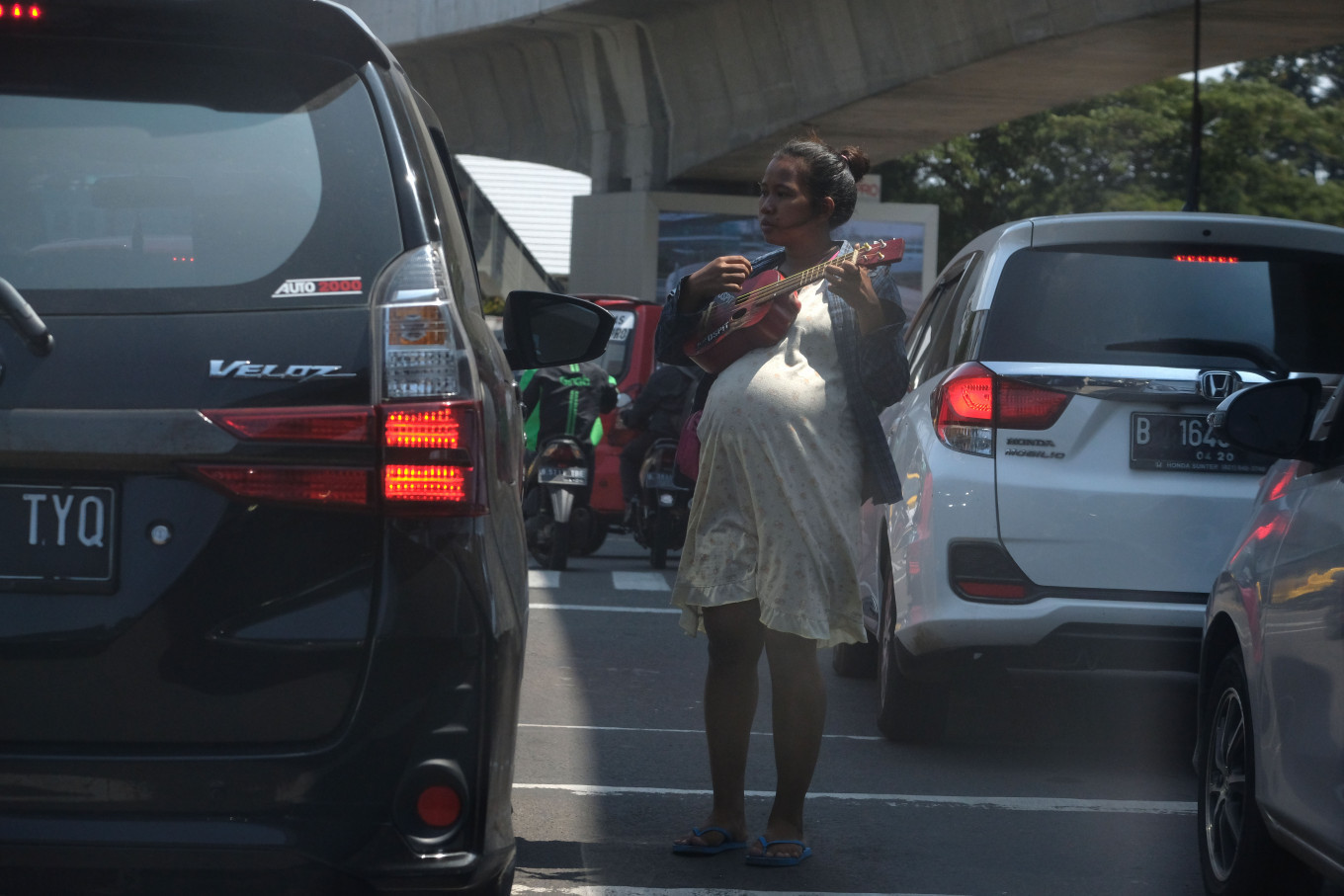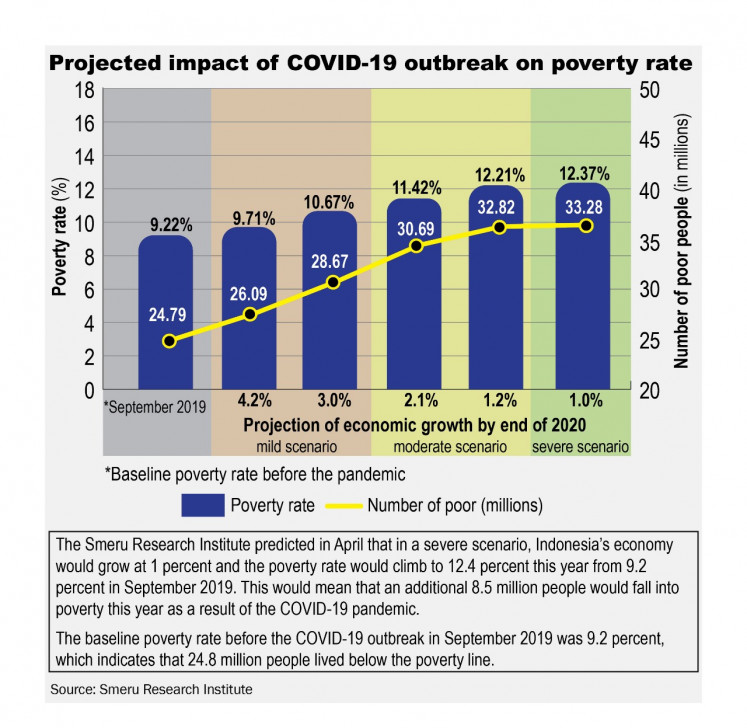Popular Reads
Top Results
Can't find what you're looking for?
View all search resultsPopular Reads
Top Results
Can't find what you're looking for?
View all search resultsCOVID-19? Recession? Don’t forget about climate change in poverty relief: Experts
Economists and activists are urging Indonesia not to overlook climate change in its poverty reduction efforts amid the COVID-19 pandemic, as looming climate crises could exacerbate poverty in the long run.
Change text size
Gift Premium Articles
to Anyone
Economists and activists are urging Indonesia not to overlook climate change in its poverty reduction efforts amid the COVID-19 pandemic, as looming climate crises could exacerbate poverty in the long run.
Think Policy Indonesia cofounder and environmental economist Andhyta F. Utami said that taking an environmental approach to poverty reduction was crucial, as increasingly frequent natural disasters disproportionately affected the poorest Indonesians.
For instance, long droughts as a result of climate change could cause crop failures, which would cause food shortages that would hit low-income earners hardest.
“We are now talking about COVID-19 and COVID-19 seems like a huge issue [...] and we have to face an economic recession,” Andhyta said during a recent webinar organized by the SMERU Research Institute and the Knowledge Sector Initiative (KSI).
“But compared to all of that, the climate crisis that will be worse in five to 10 years is an even bigger problem.”
Therefore, she urged Indonesia to follow a different economic model that focused on restoring and conserving the environment, citing Oxford economist Kate Raworth’s “doughnut” economic model, which seeks to balance the needs of people and the environment, as an example.
Andhyta also suggested Indonesia tap into initiatives like the carbon trading market and "payment for ecosystem services" to tackle the issue. The latter could be done by incentivizing upstream restoration in exchange for payment from people living in the downstream area that benefit from the restoration.
Read also: Indonesia speeds up regulation on global carbon trading
Andhyta’s appeal comes against the backdrop of the heavy toll the COVID-19 pandemic has taken on the country’s poor.
Statistics Indonesia (BPS) data from September 2019 showed that 24.79 million Indonesians lived in poverty, equivalent to 9.22 percent of the total population.
Projected impact of COVID-19 outbreak on poverty rate (JP/Smeru Research Institute)A SMERU report in April this year projected that about 8.5 million people would fall into poverty in 2020 as a result of the COVID-19 pandemic. If the prediction holds true, the number of poor will surge to 33.24 million, or 12.37 percent of Indonesia’s total population.
This comes after around 1.63 million Indonesians fell into poverty between September last year and March, BPS announced in July.
Meanwhile, Indonesia is still miles away from resolving its environmental and wildlife problems. National Disaster Mitigation Agency (BNPB) data show that land and forest fires ravaged 942,484 hectares of the country in 2019, almost double the area affected in 2018 – gutting natural habitats and threatening the nation’s biodiversity.
But despite such risks, the country has not adopted an ecological approach to the development of its economic policies and COVID-19 recovery plan, as shown by the passing of the environmentally hazardous Job Creation Law and the government’s prioritization of economic recovery above other needs, the Indonesian Forum for the Environment (Walhi) said.
Read also: Omnibus law ‘may sacrifice’ human rights, environment
Walhi urged the government to draw a stronger connection between its current policies and climate change, as extreme changes to the climate would harm the poor the most and jeopardize the livelihoods of farmers, fishermen and people who live along the country’s coastlines.
“We have to correct our perspective on climate change,” Walhi campaign manager Yuyun Harmono told The Jakarta Post on Thursday.
He also called for the government to push companies that extract natural resources to carry out an eco-friendly transformation of their operations to prevent further negative impacts on disadvantaged communities, citing various reports that show the large contributions corporations make toward climate change.
About 71 percent of global emissions since 1988 can be attributed to just 100 companies, which includes Indonesia’s state-owned oil and gas giant PT Pertamina, a 2017 report by environmental nonprofit CDP and the Climate Accountability Institute showed.
National Development Planning Board (Bappenas) director of poverty alleviation and social welfare Maliki said various policies had been developed to tackle environmental degradation caused by the private sector, such as regulations that call for the use of eco-friendly technologies and prohibit companies from building facilities in landslide-prone areas.
In the context of poverty alleviation, the government has continued to educate low-income families about eco-friendly habits through family development sessions run under the Family Hope Program (PKH), a conditional cash assistance program.
Read also: PKH boosts livelihoods of low-income families
Under its agrarian reform and social forestry initiatives, the Environment and Forestry Ministry has also educated families on how to better extract natural resources for their subsistence without using the “slash-and-burn” method.
The government is also working to economically empower low-income families with considerations to climate risks using the National Disaster Mitigation Agency’s (BNPB) InaRISK – a data service platform that aims to illustrate the potential for disasters in every area of Indonesia.
By 2022, Bappenas also strives to develop an “adaptive social protection” framework with which to build a social protection system that can tackle climate change issues and anticipate disasters, be they natural disasters or “social” disasters like COVID-19, Maliki said.
“Poverty reduction is heavily impacted by environmental disruptions. If the environment is damaged, many people will be affected and fall into poverty,” he said.











